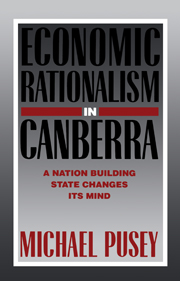INTRODUCTION: Canberra in the balance
Published online by Cambridge University Press: 14 January 2010
Summary
In the whole world cultural specificity and general factors of modernisation are related. The largest field for research in the social sciences is opened up by the comparative study of paths of development, each defined by its mode of relation between reason and cultural specificity - and also by the forms of rupture between them.
Alain Touraine, 19891Instead of the State being regarded any longer as an object of hostility to the labourer, it should now become identified with an interest in his works, and in all workers, extending to them its sympathy and protection, and watching over their welfare and prosperity.
Alfred Deakin, 1890Deakin, a founding father of the Australian federal state, and one of several liberals and ‘men of universal sympathy’, uttered these words at a time when the ‘Lucky Country’ was the social lighthouse of the world. In these first moments of what was to be ‘the age of the common man’ in this male-oriented society, Australian men at least enjoyed the highest standards of living of any nation on earth. At the time of Federation in 1901 Australia was still, as it would be for much of the first half of this century, the model social democracy of the world, while Sweden (the successor model) was Europe's ‘poorhouse fortress’. These were the benefits of a nation that was ‘born modern’ from a knowledge and conviction that the state would be the ‘most likely protector of individual rights against other agencies of social coercion’ and, indeed, ‘that the major constraints on individual liberty were not public but private’. One hundred years later, as Canberra is swept by a locust strike of economic rationalism, the fate of this social experiment would seem to be in the unfriendly grip of ideas that come instead from Britain and the United States - the two great ‘stateless societies’ as Nettl once described them.
- Type
- Chapter
- Information
- Economic Rationalism in CanberraA Nation-Building State Changes its Mind, pp. 1 - 26Publisher: Cambridge University PressPrint publication year: 1989



